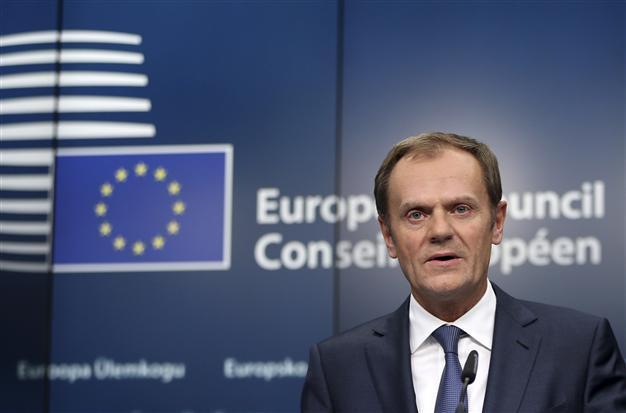EU needs years-long Russia strategy, new leader warns
BRUSSELS - Agence France-Presse

European Council President Donald Tusk addresses a news conference following a European Union leaders summit in Brussels December 18, 2014. REUTERS Photo
The European Union must thrash out a strategy for Russia that lasts for many years, and looks past sanctions that have hammered Moscow's economy, the bloc's new leader Donald Tusk warned Dec. 18.
Leaders at a summit in Brussels also called for the urgent launch of a huge 315-billion-euro ($380-billion) investment plan aimed at kick-starting Europe's economy, although there were no pledges of hard cash.
As the EU agreed new sanctions against Crimea, which was annexed by Russia from Ukraine in March, former Polish prime minister Tusk used his first summit as European Council president to take a longer-term view.
"We must go beyond being reactive and defensive. As Europeans, we must regain our self-confidence and realise our own strength," Tusk told a press conference after the summit when asked about Russia.
"This is maybe not a never-ending story but we need a long-perspective strategy. It will need... plans for years, not only for weeks or for months."
The summit wrapped up after just one evening, a far cry from often-marathon EU meetings, and a sign of Tusk's new style at the helm of the 28-nation bloc.
Tusk's Russia comments also hinted at a shift in policy, with EU nations showing little appetite for stronger sanctions as they eye blowback on their own struggling economies from the recent collapse of Russia's currency.
The EU adopted punitive measures against Moscow for its backing of rebels in Ukraine following the shooting down of Malaysia Airlines flight MH17 in July.
But the latest set of sanctions, the EU's first since September, were limited to investments in Crimea and left Russian businesses and acolytes of Russian President Vladimir Putin untouched.
Russia's economy has begun to suffer badly with the run on the ruble, even as Putin insisted Thursday that it would recover.
European leaders put up a united front on Thursday, saying that the sanctions could be reversed if Putin changes course and pro-Kremlin separatists agree to a peace deal signed in Minsk in September.
"The door is always open if Russia changes its behaviour," British Prime Minister David Cameron said after the summit, adding however that there was a "very clear, unanimous and unified view" at the summit that sanctions should stay for now.
French President Francois Hollande -- who spoke with Putin and Ukrainian President Petro Poroshenko earlier this week -- suggested that the EU could "de-escalate" sanctions if Russia shifted on the Ukraine conflict, which has claimed more than 4,600 lives.
The leaders issued a statement after the summit saying they were ready to contribute more financial aid to nearly-bankrupt Ukraine along with the International Monetary Fund, so long as Kiev introduces political reforms.
Meanwhile the EU leaders agreed on the need to push forward European Commission president Jean-Claude Juncker's flagship plan to invest in infrastructure and revive the bloc's stalling economy.
"We called for the urgent establishment of the strategic investment programme," Tusk said.
The plan counts on seed money of 21 billion euros leveraged to create 315 billion euros in eventual investments in huge energy, transport and technology schemes.
But in spite of Juncker's call for EU states to put their hands in their pockets, he said that no specific pledges of money would be made at the summit.
Juncker had a dig at some leaders who had called the overall package "measly" and pushed them to contribute.
He added that whatever they give will not be counted as part of their national budgets, many of which are in breach of deficit rules that Brussels has tightened up considerably during the debt crisis.
Juncker is set to present new details on the plan in January and the EU aims to have it up and running by mid-2015.
German Chancellor Angela Merkel, leader of the EU's biggest economy, said the plan was "welcomed by all of us" but said work on it must now be "intensive".
